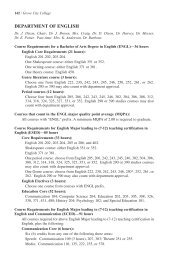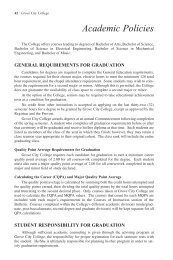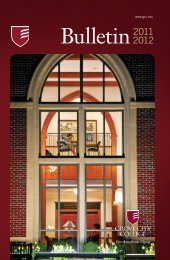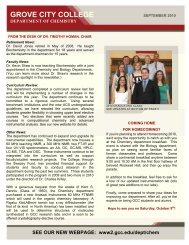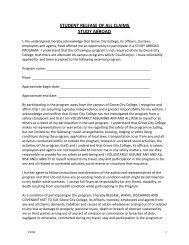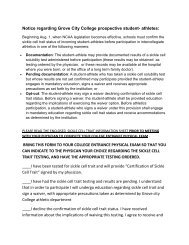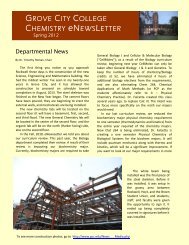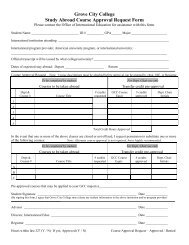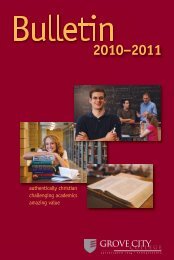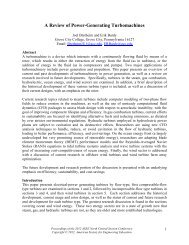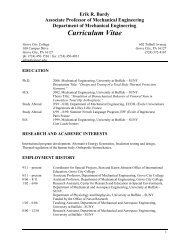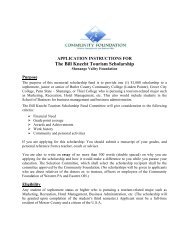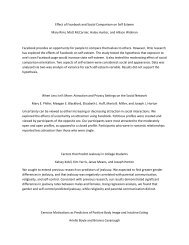2009–2010 - Grove City College
2009–2010 - Grove City College
2009–2010 - Grove City College
You also want an ePaper? Increase the reach of your titles
YUMPU automatically turns print PDFs into web optimized ePapers that Google loves.
Course Requirements for a minor in Communication Studies (18 hours)<br />
Communication Studies Core (6 hours):<br />
Communication 104 or 109 (total of 3 hours).<br />
One theory course from Communication 207, 212, 222, 305, or 350.<br />
Communication Studies Electives (12 hours):<br />
Choose 12 hours from any courses with COMM prefix. Business 420 and<br />
Entrepreneurship 459 may also count as Communication Studies electives. The one<br />
credit course, Theatre 259, may be repeated, and a maximum of three hours may<br />
count toward the minor. A Communication Internship (Communication 480) may<br />
not count as an elective course toward the minor.<br />
Minor in Theatre (24 hours)<br />
See the Department of English section.<br />
Communication Studies / 97<br />
COMMUNICATION STUDIES (COMM)<br />
COMM 104. PUBLIC SPEAKING AND RHETORIC. Introduces students to the preparation and<br />
presentation of material for a variety of public speaking situations. This performance-oriented class<br />
offers instruction in the theory of rhetoric, material development, and delivery techniques. Students<br />
will review the historical importance of oral communication and the role it plays in society. This<br />
course fulfills the Speaking Intensive (SI) and part of the Information Literacy (IL) requirement for<br />
Communication Studies majors. Semester course, three hours.<br />
COMM 109. FORENSICS. A skills-based course designed to improve students’ ability to analyze<br />
ideas, advocate ideas in individual debate, and to prepare and deliver oral communications. Students<br />
will develop and refine their ability to research, organize, and present orally ideas in the form of<br />
informative, critical, and persuasive speeches, Lincoln-Douglas style debates, or individual performances<br />
of literature in the form of oral interpretation of literature. Co-requisite: participation with the<br />
intercollegiate forensics (speech & debate) team, or consent of the instructor. May be taken up to three<br />
times. Semester course, one hour.<br />
COMM 135. WRITING FOR THE MEDIA. Provides an introduction to the substance, structure,<br />
and style of multiple forms of non-narrative mass media including print, broadcast, film, and the<br />
Internet. It is required for the Communication Studies major. Semester course, three hours.<br />
COMM 207. THEORIES OF COMMUNICATION. Focuses on the history of communication,<br />
including rhetorical and communication theory from the classics to modern times. Students are introduced<br />
to the body of communication literature through article analysis and literature review exercises.<br />
Students study the theoretical underpinnings of the practice of communication in its various settings:<br />
public, relationships, small groups, organizations, mass media, and intercultural. The course examines<br />
the functions, structures, and processes of communication in a variety of contexts. This course, along<br />
with Communication 104, 212, 305, and 427, fulfills the Information Literacy (IL) requirement for<br />
Communication Studies majors. Semester course, three hours.<br />
COMM 212. RESEARCH METHODS IN COMMUNICATION. Examines the fundamentals of<br />
research approaches and methods in communication studies, both qualitative and quantitative. The<br />
course also examines a variety of actual communication research studies across the breadth of the field<br />
from interpersonal to mass communication. Students will learn questionnaire design and interviewing<br />
techniques. This course, along with Communication 427, fulfills the Writing Intensive (WI) requirement,<br />
and along with Communication 104, 207, 305 and 427, fulfills the Information Literacy (IL)<br />
requirement for Communication Studies majors. Semester course, three hours.<br />
COMM 222. FILM HISTORY AND THEORY. Encompasses the history of the motion picture<br />
from its invention in 1895 to the present day, focusing on American film. Introduction to film theories<br />
and criticism including principles of aesthetics and the art of how a film is created, from concept to<br />
completion. Fall semester only, three hours.



